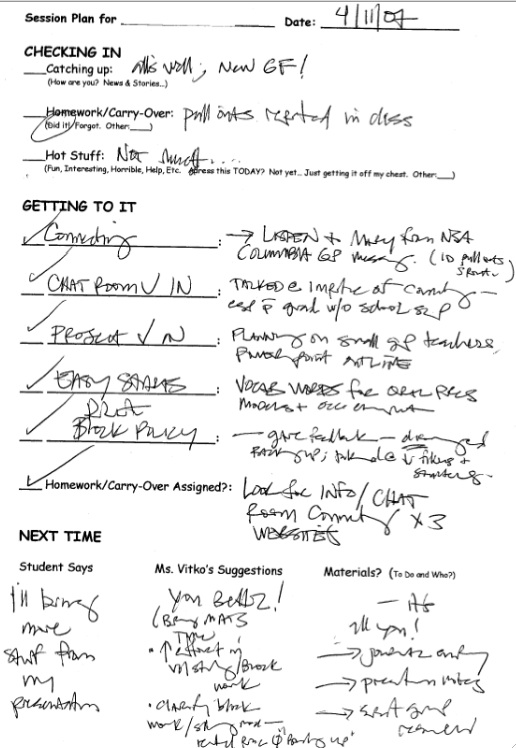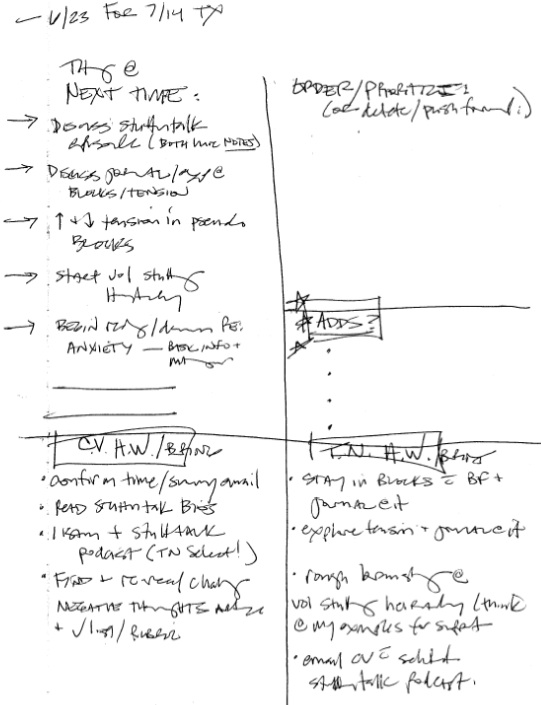Increasing Client Ownership of Goals and Participation in Therapy
 |
About the presenter: Carrie L. Vitko, MS, CCC-SLP, BRS-FD works as a clinical supervisor for Bloomsburg University in Bloomsburg Pennsylvania. She currently supervises graduate speech clinicians working in an elementary school setting. Carrie can often be found recycling or trying to get her wonderful children to stop arguing. |
Increasing Client Ownership of Goals and Participation in Therapy
by Carrie Vitko
from Pennsylvania, USA
My use of scaffolds to support co-created therapy plans actually began when I was much newer to stuttering therapy. In viewing video taped segments of my sessions, I saw myself spending A LOT of time 'checking in' and 'building rapport' with my older stuttering clients, instead of moving more quickly into the heart of the session. Why? I was uncomfortable! I felt pretty confident with elementary school aged clients - but not so much with teens and young adults. New to the level of counseling required, and hacking through the instruction of various modification techniques, it relieved my own anxiety to forever postpone those activities and instead look begrudgingly at the clock and mutter, "Is it two o'clock already? Time flies when we work together. Next time we'll be SURE to hit those cancellations!"
So, in order to move myself along, I created a therapy scaffold that I kept on the table for the client and I to both view. The major headings were CHECKING IN, GETTING TO IT, and NEXT TIME. I've attached an example of the template below for review.

The scaffold did indeed help me to limit my 'How's it going' time, and pushed me into more active more effective stuttering intervention. Super. That's why I created it. But my use of a therapy scaffold had some greater and unexpected benefits for a clinician working toward developing her stuttering therapy skills. Over time, I had my clients edit and prioritize the 'getting to it' section. And I eventually had my clients actually pick up the pen and write down their suggestions in the 'next time' section. Instead of me assigning homework, we were brainstorming activities. The result? I perceived an increase in effort and authentic participation in sessions. The emergence of real 'ownership' of session targets - instead of mere compliance (or "almost-partial-compliance" - which is what I had been experiencing with one of my first older male teenage clients.) I also perceived that my client-clinician relationships became more truly balanced. No longer was I coming to sessions with a plan that I had written after the session - I was representing a plan that was largely co-created during the previous session. A plan that was then reviewed and tweaked based on the outcomes of homework (some of which was actually getting completed!), the content of journal entries, and the needs presented by the client in that still important 'checking in' period. I think clinicians can co-plan sessions without premade templates or forms. The typed template I cited earlier is actually an old one - I've been meaning to revise it for a while. So recently when I was working with a young lady who stutters, I just flipped to a clean page in our therapy notebook, grabbed my pen, and divided it into five sections. MY HOMEWORK, YOUR HOMEWORK, THINKING ABOUT NEXT TIME, ORDER/PRIORITIZE, and ADD. The first three sections filled quickly as throughout the hour we determined topics we wanted to cover and outside assignments that would need to be completed before the next session. The last two sections I left intentionally blank - a place for us to review what we'd developed the week prior, add to, delete from, and prioritize, and then get to it. An example of this handwritten method is included below.

I have found this method of collaborative session planning invaluable. I perceive that this practice has supported my clients' acceptance of responsibility in and out of sessions, increased their level of commitment, supported the ongoing exploration of stuttering in their lives, and made for truly relevant intervention. Happy co-planning.
References:
The Skilled Helper - Eighth Edition by Gerad Egan
The Stuttering Foundation DVD No. 9506: Stuttering Intervention for Teens - featuring Patricia Zebrowski, Ph.D.

